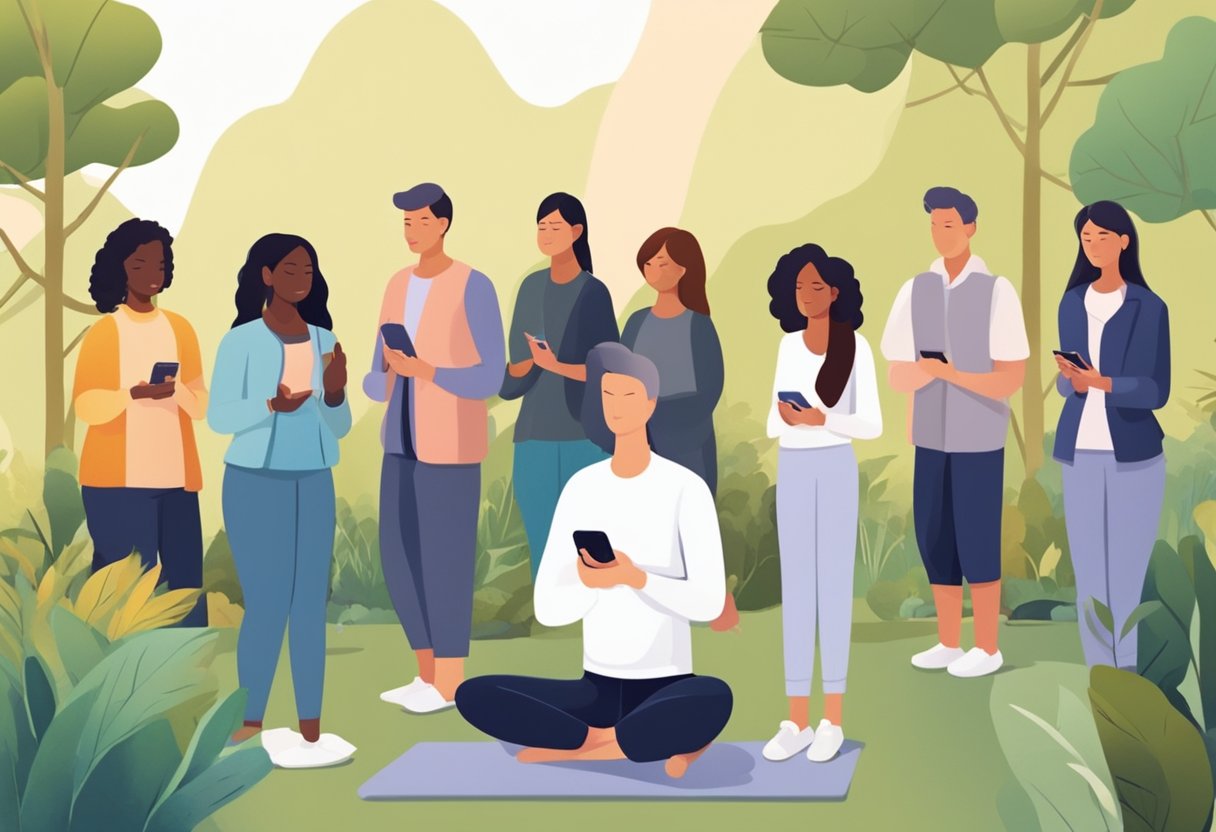Meditation has been around for centuries, but it is only in recent years that it has become more accessible to people around the world.
One of the biggest reasons for this is the rise of mobile apps that offer guided meditation sessions, making it easier for people to practice mindfulness and improve their mental health and well-being.
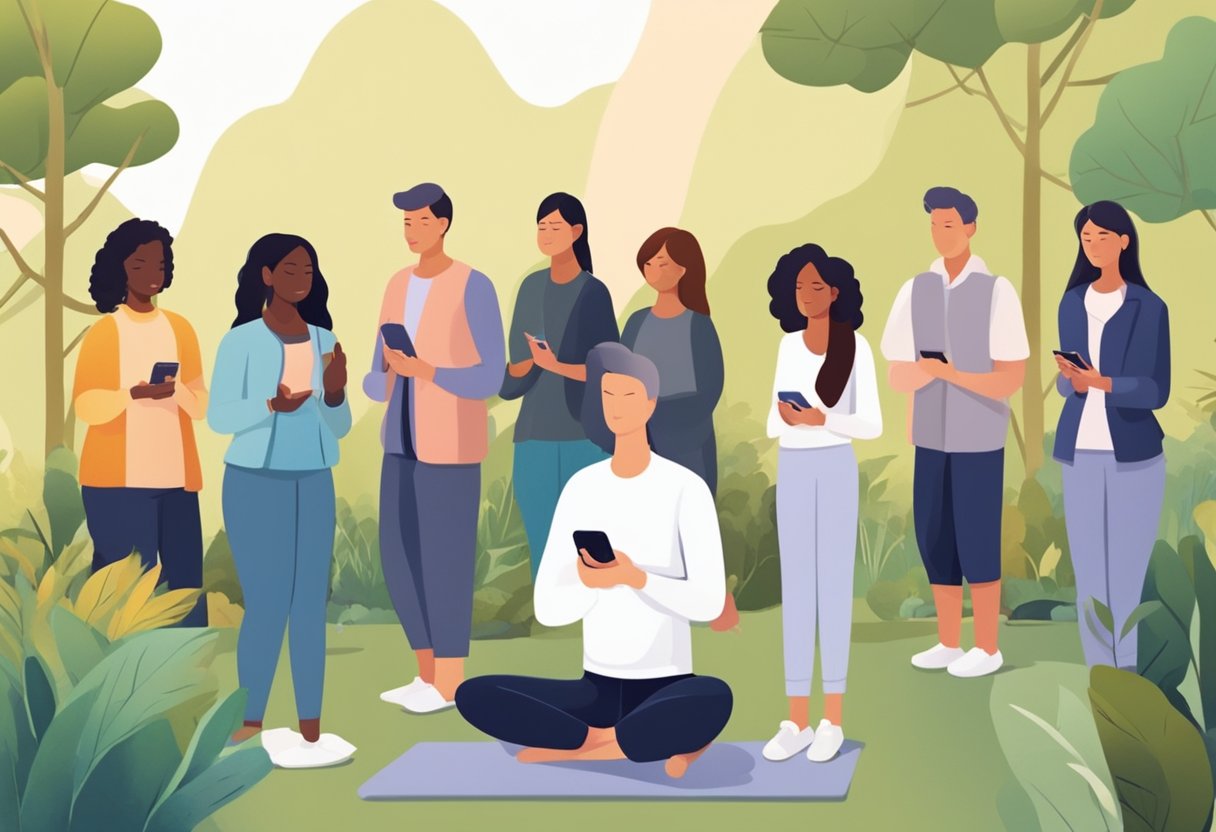
Mobile apps are making meditation accessible to everyone by providing guided meditation sessions that walk users through each step of the practice.
These apps offer a range of features and functionalities that cater to different age groups and aspects of life such as school, work, and sports.
Users can choose from a variety of meditation techniques and customize their sessions according to their preferences.
The benefits of mobile apps in meditation practice are immense. They offer a touch of tech-savvy to the ancient practice and make it easier for people to practice mindfulness on-the-go.
In this article, we will explore how mobile apps are revolutionizing the way people meditate and how they are improving accessibility to this ancient practice.
Key Takeaways
- Mobile apps are making meditation accessible to everyone by providing guided meditation sessions that cater to different age groups and aspects of life.
- The benefits of mobile apps in meditation practice are immense, as they offer a touch of tech-savvy to the ancient practice and make it easier for people to practice mindfulness on-the-go.
- Mobile apps are revolutionizing the way people meditate and improving accessibility to this ancient practice.
The Rise of Mobile Apps in Meditation Practice
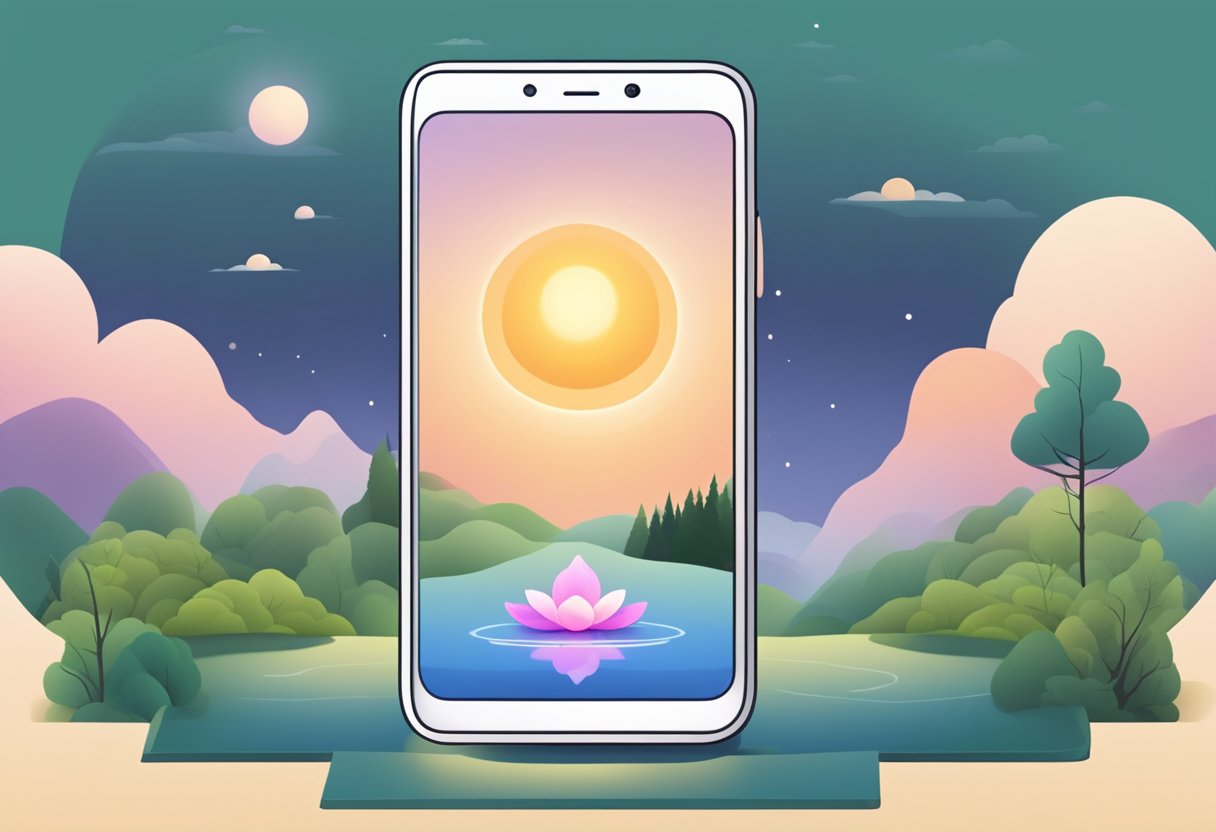
Meditation has been a part of human culture for thousands of years, with its roots traced back to ancient India. However, with the rise of modern technology, meditation practice has become more accessible than ever before.
In particular, mobile apps have played a significant role in making meditation practice available to everyone, regardless of their location or experience level.
From Ancient Tradition to Modern Technology
Meditation has been practiced for centuries, with its origins rooted in ancient Indian traditions. Over time, it has spread across the world, with different cultures and religions adopting their unique styles and techniques.
In recent years, meditation has gained popularity in the West, with many people seeking ways to manage stress, improve focus, and enhance their overall well-being.
The rise of mobile apps has made meditation practice more accessible than ever before.
Today, there are hundreds of meditation apps available, each offering a unique approach to meditation practice.
These apps provide users with guided meditations, music, and other resources to help them develop a regular meditation practice.
The Impact of the Pandemic on Digital Meditation
The COVID-19 pandemic has had a significant impact on people’s mental health, with many experiencing increased stress, anxiety, and depression.
As a result, there has been a surge in demand for digital mental health resources, including meditation apps.
The pandemic has forced many people to stay at home, making it difficult for them to access in-person meditation classes and workshops.
Mobile apps have provided a solution, allowing people to practice meditation from the comfort of their own homes.
Furthermore, many meditation apps have introduced new features to help users manage pandemic-related stress, such as guided meditations focused on anxiety and stress reduction.
Enhancing Accessibility Through Mobile Applications
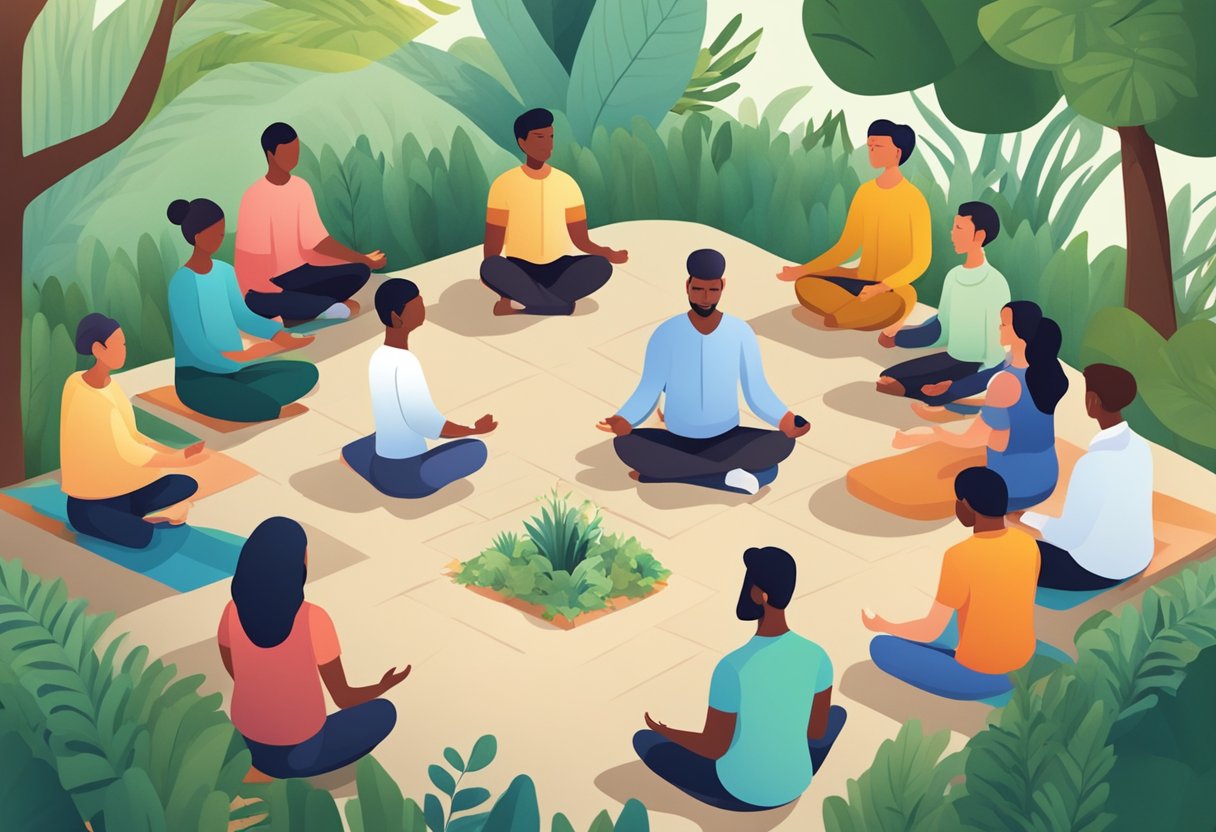
Mobile applications have revolutionized the way people access and practice meditation. With just a few taps on a mobile device, individuals can access a wide range of meditation programs and techniques from anywhere in the world.
This has made meditation more accessible than ever before, breaking down barriers for individuals with disabilities and expanding its reach globally.
Breaking Barriers for Individuals With Disabilities
Mobile applications have made meditation more accessible to individuals with disabilities.
Many apps offer features such as closed captions, audio descriptions, and voiceover support, making it easier for people with hearing or visual impairments to follow along with guided meditations.
Additionally, some apps offer features such as haptic feedback, which provides physical vibrations to help individuals stay focused during meditation.
Global Reach and Localized Content
Mobile applications have also made meditation more accessible on a global scale.
With apps available in multiple languages, individuals around the world can access meditation programs and techniques in their native language.
This has helped to break down language barriers and make meditation more accessible to people from diverse backgrounds.
Moreover, many apps offer localized content that is tailored to specific regions and cultures.
This helps to make meditation more relatable and accessible to individuals from different parts of the world.
For instance, some apps offer meditation programs that incorporate traditional practices from different cultures, such as yoga and mindfulness practices from India and China.
Improving Mental Health and Well-Being
Mobile apps are making meditation accessible to everyone, and this has a positive impact on mental health and well-being.
Meditation has been shown to reduce anxiety, stress, and depression, and improve psychological wellbeing.
With the help of mobile apps, people can now practice meditation anywhere, anytime, and at their convenience.
Addressing Anxiety, Stress, and Depression
Meditation has been proven to be an effective method for addressing anxiety, stress, and depression.
Mobile apps provide users with guided meditations that help them focus on their breath and quiet their minds.
By doing so, users can reduce their stress levels, calm their minds, and improve their mood.
Mobile apps also provide users with tools to track their progress and monitor their mental health.
Users can set goals, track their progress, and receive reminders to practice meditation regularly.
These features help users stay on track with their meditation practice and improve their mental health over time.
Monitoring and Enhancing Psychological Wellbeing
Mobile apps are also useful for monitoring and enhancing psychological wellbeing.
Users can access a variety of meditation techniques, such as mindfulness, loving-kindness, and body scan meditations.
These techniques help users cultivate positive emotions, such as gratitude, compassion, and joy.
Mobile apps also provide users with resources to improve their overall well-being, such as articles, podcasts, and videos on mental health and wellness.
These resources help users learn more about mental health, develop healthy habits, and improve their overall quality of life.
The Efficacy of App-Based Meditation Interventions
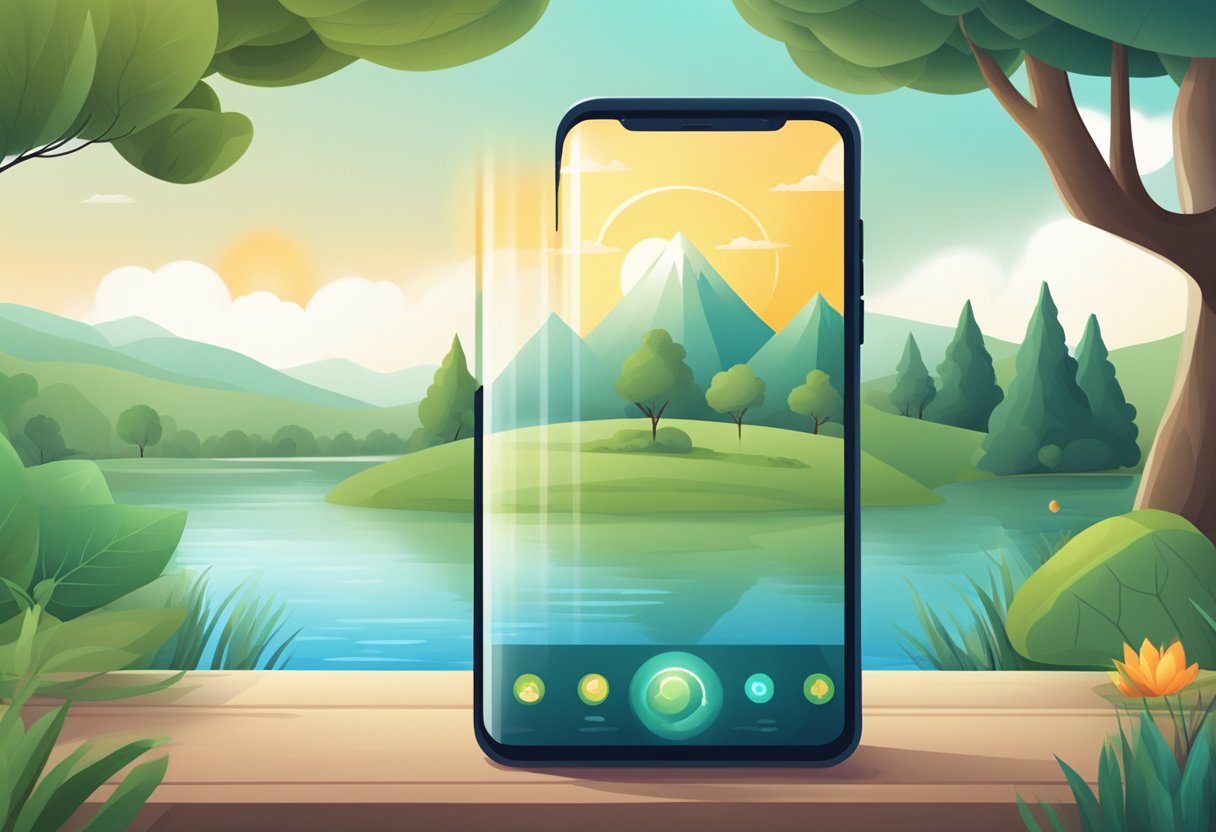
Mobile apps have made meditation accessible to everyone, regardless of their location or time constraints. In this section, we will explore the efficacy of app-based meditation interventions, based on scientific evidence from systematic reviews and trials, as well as user engagement and habit formation.
Scientific Evidence From Systematic Reviews and Trials
Several systematic reviews and randomized controlled trials have been conducted to investigate the efficacy of app-based meditation interventions.
A systematic review of published studies by Wahbeh et al. (2018) found that app-based mindfulness interventions were effective in reducing symptoms of anxiety and depression, as well as improving overall well-being.
Another systematic review by Li et al. (2018) concluded that app-based mindfulness interventions were effective in reducing stress and anxiety in adults.
A randomized controlled trial by Mani et al. (2015) investigated the efficacy of an app-based meditation intervention in reducing stress in college students.
The study found that the intervention group had a significant reduction in stress levels compared to the control group.
Similarly, a randomized controlled trial by Huberty et al. (2019) found that an app-based mindfulness intervention was effective in reducing symptoms of depression and anxiety in adults.
User Engagement and Habit Formation
User engagement and habit formation are crucial factors in the efficacy of app-based meditation interventions.
A study by Crane et al. (2015) found that user engagement with a mindfulness app was positively associated with improvements in well-being and stress reduction.
Furthermore, a study by Ly et al. (2019) found that habit formation was a key predictor of sustained engagement with a mindfulness app.
To promote user engagement and habit formation, many app-based meditation interventions incorporate features such as gamification, personalized feedback, and reminders.
For example, the app “Headspace” includes a “streak” feature that rewards users for consecutive days of meditation, while the app “Calm” includes personalized recommendations based on user preferences.
Features and Functionalities of Leading Meditation Apps

Comparing Headspace and Calm
Two of the most popular meditation apps in the market are Headspace and Calm. Both these apps offer a range of features and functionalities that make meditation accessible to everyone.
Headspace has a user-friendly interface that allows easy navigation. The app offers guided meditations for different moods, such as stress, anxiety, and sleep.
In addition, Headspace offers a range of courses that cover various aspects of meditation, including mindfulness, focus, and creativity. Users can also set reminders to ensure that they meditate regularly.
Calm, on the other hand, offers guided meditations, sleep stories, and breathing exercises.
The app has a unique feature called “Daily Calm,” which is a 10-minute meditation session that is updated every day.
Calm also offers a range of courses that cover different aspects of meditation, including gratitude, self-esteem, and relationships.
Innovative Features for Personalized Experiences
Meditation apps are constantly evolving to offer innovative features that provide users with personalized experiences.
Some of these features include:
- Mood tracking: Some apps allow users to track their mood before and after a meditation session. This feature helps users understand how meditation affects their mood and overall well-being.
- Focus music: Some apps offer music that is specifically designed to help users focus during meditation sessions.
- Sleep sounds: Many apps offer a range of sounds that are designed to help users fall asleep. These sounds include white noise, nature sounds, and calming melodies.
- Customizable sessions: Some apps allow users to customize their meditation sessions by selecting the length of the session, the type of meditation, and the background music.

